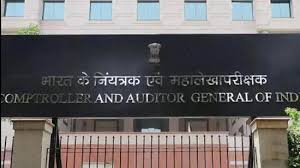The Indian Constitution (Article 148) provides for an independent office of Comptroller and Auditor General of India (CAG). He is the custodian of public finances and controls the entire financial system of the country at both levels – the centre and the states. His role is to uphold the Constitution of India and the Acts of Parliament in the field of financial management. This is the reason why Dr. B. R Ambedkar said that CAG should be the most important official of the Constitution of India. He is one of the bulwarks of the democratic system of government in India.

Table of Contents
Appointment and Term
The CAG is appointed by the President of India by a power of attorney bearing his hand and seal. Before taking office, the CAG shall take an oath before the President to:
- Render allegiance and obedience to the Constitution of India
- Uphold the sovereignty and integrity of India
- Discharge the duties of his office duly and faithfully to the best of his ability, without fear or favour, affection or disfavor, and
- Uphold the Constitution and the laws.
The term of office shall be six years or until the age of 65, whichever is earlier. He may resign from office at any time by sending a letter of resignation to the President. The President may also remove him for the same reasons and in the same manner as a Supreme Court Justice.
In other words, he may be removed from office by the President on the basis of a resolution to that effect passed by a special majority of both Houses of Parliament, either for proven misconduct or for incapacity.
Independence of Comptroller and Auditor General of India (CAG)
The Constitution contains the following provisions to protect and guarantee the independence of the
CAG:
- It is vested with tenure security. He may be removed by the President only in accordance with the procedure provided for in the Constitution. Thus, he does not hold office until the President’s pleasure, although he was appointed by the President.
- After leaving office, he cannot hold any other office, either in the Government of India or in any other state.
- His salary and other terms of service are set by Parliament. His salary is the same as that of a judge of the Supreme Court.
- Neither his salary nor his rights with respect to leave of absence, pension, or retirement age may be changed to his disadvantage after his appointment.
- The terms and conditions of service of the employees of the Indian Audit and Accounts Department and the administrative powers of the CAG shall be determined by the President after consultation with the CAG.
- The administrative expenses of the CAG office, including all salaries, allowances, and pensions of persons working in the office, shall be borne by the Consolidated Fund of India. Therefore, they are not subject to the vote of the Parliament. Moreover, no minister can represent CAG in Parliament (both Houses), and no minister can be asked to take responsibility for his or her actions.
Duties and Powers of CAG
The Constitution (Article 149) empowers Parliament to define the functions and powers of the CAG. List of Powers and Duties of CAG are as under:
- It audits the accounts in respect of all expenditure of the Consolidated Fund of India, the Consolidated Fund of each State and the Consolidated Fund of each Union Territory having a Legislative Assembly.
- It shall audit all expenditures from the Contingency Fund of India and the Public Account of India and the Contingency Fund of each State and the Public Account of each State.
- It shall audit all commercial, production, profit and loss, balance sheets and other subsidiary accounts maintained by any department of the Central Government and the State Governments.
- It shall examine the revenues and expenditures of the Centre and of each State to ascertain that the rules and procedures relating thereto provide effective control over the assessment, collection, and proper application of revenues.
- He shall advise the President in determining the form in which the accounts of the
Centre and of the States shall be kept. - He submits his audit reports on the accounts of the Centre to the President, who in turn submits them to both Houses of Parliament (Article 151).
- He submits his audit reports on the accounts of a State to the Governor, who in turn submits them to the State Legislature.
- He shall examine and certify the net proceeds of all taxes and duties (Article 279). His certification is final. The ‘net revenue” is the revenue of a tax or levy minus the cost of collecting it.
- He acts as the leader, friend, and philosopher of the Audit Committee of the Legislature.
- The Public Accounts Committee examines the report of CAG and reports its findings to the Parliament.
Important Links